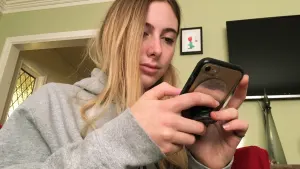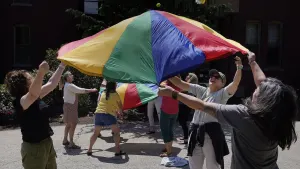More Stories
Children's hospitals in parts of the U.S. are seeing a surge in a common respiratory illness that can cause severe breathing problems for babies.
RSV cases fell dramatically two years ago as the pandemic shut down schools, day cares and businesses. With restrictions easing in the summer of 2021, doctors saw an alarming increase in what is normally a fall and winter virus.
Now, it's back again. And doctors are bracing for the possibility that RSV, flu and COVID-19 could combine to stress hospitals.
“I'm calling it an emergency,” said Dr. Juan Salazar of Connecticut Children’s Hospital, where RSV has caused a shuffling of patients into playrooms and other spaces not normally used for beds. The institution explored using a National Guard field hospital, but has set aside that option for now.
A look at RSV and what the recent surge may mean:
WHAT IS RSV?
It stands for respiratory syncytial virus, a common cause of mild cold-like symptoms such as runny nose, cough and fever. Nearly all U.S. children normally catch an RSV infection by age 2.
People infected are usually contagious for three to eight days. Babies and people with weakened immune systems can spread RSV for up to four weeks. There is no vaccine for it, though several candidates are in testing.
WHO DOES IT AFFECT?
Everyone can get RSV. But it causes the most threat to infants, older adults and other vulnerable people, who can get serious airway and lung infections.
Among U.S. kids under age 5, RSV typically leads to 58,000 hospitalizations and up to 500 deaths in a year.
For adults 65 and older, RSV causes 177,000 hospitalizations and 14,000 deaths yearly.
For babies, the struggle to breathe can interfere with eating. “And that’s really when we start to worry,” said Dr. Melanie Kitagawa of Texas Children’s Hospital in Houston, where more than 40 children have RSV.
“They’re breathing fast, breathing deep. We see them using muscles in their chest to help them breathe,” Kitagawa said. “These are kids who are having difficulty taking a bottle because their breathing is being impacted and they can't coordinate both at once."
WHY IS THERE AN INCREASE NOW?
The virus is encountering a highly vulnerable population of babies and children who were sheltered from common bugs during the pandemic lockdowns.
Immune systems might not be as prepared to fight the virus after more than two years of masking, which offered protection, according to Dr. Elizabeth Mack of Medical University of South Carolina.
“South Carolina is drowning in RSV,” Mack said in a news release. The surge arrived earlier this year than normal, she said.
For babies, their mothers may not have been infected with RSV during pregnancy, which could have given the children some immunity.
U.S. health officials have noted a rise this month in national reports of respiratory illnesses, which they say is at least partly due to the early spread of flu in much of the South.
Last week, more than 7,000 tests came back positive for RSV, according to CDC figures. That's more than in previous surges.
IS THERE A TREATMENT?
There's no specific treatment, so it's a matter of managing symptoms and letting the virus run its course. Doctors may prescribe oral steroids or an inhaler to make breathing easier.
In serious cases, patients in the hospital may get oxygen, a breathing tube or a ventilator.
WHAT DO DOCTORS RECOMMEND?
Prevent the spread of viruses by washing hands thoroughly and staying home when you're sick.
If you're worried your child is having a severe breathing problem, “do not hesitate” to go to an emergency department or call 911, said Dr. Russell Migita of Seattle Children’s Hospital, where RSV is on the rise.
For less severe medical problems, Migita said, call your regular health care provider for advice, use telehealth or go to urgent care.
In Chicago on Saturday, Dr. Juanita Mora saw a family of five kids all with RSV, ranging from a 3-year-old to a teenager. Fearing what’s ahead this winter, she’s telling everyone to get a flu shot and a COVID-19 booster.
“We don’t want a triple whammy, a triple pandemic,” Mora said.
More from News 12
1:28

5 simple steps for long-term benefits to your health and heart
1:32

8 tips for working safely during hot weather
3:31

Guide: Ways to set your child up for financial success
3:18

Guide: The importance of good sleep and how to get it

Guide: Mental health resources available in the tri-state
9:36
